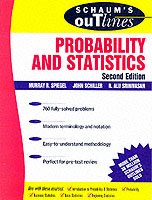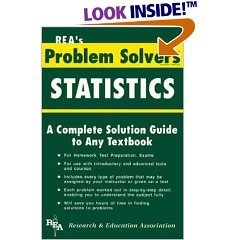Are the People Who Write These Books Promoting a Culture of "Statistical Literacy" or Are They Just Making Money by Saying It's O.K. to be Stupid?
Look, I know the phrasing of the title is wordy, a mouthful, and maybe a little awkward. In case you didn't notice, this is not the probability and diagraming sentences website/magazine/blog/stop trying to define a twenty-first century medium in terms of twentieth century vocab anyway, ...O.K.?! 
If you go to any non-university bookstore and head to the statistics or math section, you'll probably see books that fall into three categories.
The first are the books that are designed to help you prepare/practice for tests, exams, and basically pass courses the authors assume you have to take. The content of these books is often good, comprehensive given the size of these "get-through" guides, and very frequently if you actually use the books the way they were intended, you'll know a hell of a lot of statistics.



The second category of books is what I would call the "See Mom, I can be a scientist, too," type of books.  Basically, these are books that appeal the "Reading Rainbow" watcher in all of us. Remember when you were little and actually good at science? Remember how you use to come home from school and be all excited about growing a plant out of a potato in a jar or talking about the local weatherman who came to your school and talked about why clouds fill up with moisture and rain? Well, anyway these books are written in the same vein. They often try to answer the question, "What's new and interesting in statistics?", or "Why is statistics interesting to people only interested in things which affect 'the real world'?". Anyway, these books are often light on the actual instruction of statistical techniques and heavy on anecdotes. They allow a reader to be able to talk about statistics as if they knew how to do the problems, and maybe even fake the fact that they know a lot about the field. Basically, these books help a wantabe "smart guy" fake it.
Basically, these are books that appeal the "Reading Rainbow" watcher in all of us. Remember when you were little and actually good at science? Remember how you use to come home from school and be all excited about growing a plant out of a potato in a jar or talking about the local weatherman who came to your school and talked about why clouds fill up with moisture and rain? Well, anyway these books are written in the same vein. They often try to answer the question, "What's new and interesting in statistics?", or "Why is statistics interesting to people only interested in things which affect 'the real world'?". Anyway, these books are often light on the actual instruction of statistical techniques and heavy on anecdotes. They allow a reader to be able to talk about statistics as if they knew how to do the problems, and maybe even fake the fact that they know a lot about the field. Basically, these books help a wantabe "smart guy" fake it.
 Basically, these are books that appeal the "Reading Rainbow" watcher in all of us. Remember when you were little and actually good at science? Remember how you use to come home from school and be all excited about growing a plant out of a potato in a jar or talking about the local weatherman who came to your school and talked about why clouds fill up with moisture and rain? Well, anyway these books are written in the same vein. They often try to answer the question, "What's new and interesting in statistics?", or "Why is statistics interesting to people only interested in things which affect 'the real world'?". Anyway, these books are often light on the actual instruction of statistical techniques and heavy on anecdotes. They allow a reader to be able to talk about statistics as if they knew how to do the problems, and maybe even fake the fact that they know a lot about the field. Basically, these books help a wantabe "smart guy" fake it.
Basically, these are books that appeal the "Reading Rainbow" watcher in all of us. Remember when you were little and actually good at science? Remember how you use to come home from school and be all excited about growing a plant out of a potato in a jar or talking about the local weatherman who came to your school and talked about why clouds fill up with moisture and rain? Well, anyway these books are written in the same vein. They often try to answer the question, "What's new and interesting in statistics?", or "Why is statistics interesting to people only interested in things which affect 'the real world'?". Anyway, these books are often light on the actual instruction of statistical techniques and heavy on anecdotes. They allow a reader to be able to talk about statistics as if they knew how to do the problems, and maybe even fake the fact that they know a lot about the field. Basically, these books help a wantabe "smart guy" fake it.
Finally, there's the last category of books, and intuitively, I'm going to assume the best selling. Basically, these books are books which try to do what people in sales have been doing for years, or witnesses about to be cross-examined have been trained to do... anticipate a negative. The phrase, "anticipate a negative" is a phrase a lawyer friend of mine once used to describe to me the process of mentioning something negative you know the person who you are speaking with (read cross-examining attorney) is going to bring up, and making sure you get it out there preemptively (read first) and packaged with as much positive spin as you can muster. This way, when the inevitable comes out, it doesn't seem that bad, and it doesn't seem to any third party observers (read jury) that you were trying to hide something embarassing by not mentioning it yourself. These books do something similar and will try to win you over by acknowledging that statistics is boring or hard, and then after they've got you thinking that they're on your side and they understand what you're going through, they promise to teach it to you nice and easy. These books make good general overviews, but often times don't teach you very much substantively, either about how to do statistics problems or what interesting stuff going on the field of statistical science makes learning the techniques worth one's time. In other words, don't pick one of these book up if you're preparing for an AP Exam or getting ready to impress a people at a dinner party.




My personal feeling is that the wide range of books that market to people on the basis of not making people cry, while doing statistics (there really is a book like this, I kid you not), or feel pain (there really is one like this too), or market to them based on the implied fact that the subject is hard and that they are dumb (there are a bunch of them that do this), not only in the long run doesn't teach people much, because the books themselves are so shallow, but also inculcates in them a mood which the statistical profession has for years tried to change - basically, that "statistics suck!", it can be explained easily if one of these "genius authors" talks down to one enough, and that after it has been explained to an "idoit, "or a "dummy," or "demystified, "well, then pretty much that's all you're supposed to know and all you can know. 

Instead, of casting statistics in a positive light and explaining it "simply" with the implicit assumption that someone will want to learn it well, so they can do all sorts of interesting (now there's a concept) things and which could overtime make a difference in how motivated the mainstream public is to become "statistically literate," the opposite is done, and the opposite effect achieved!

0 Comments:
Post a Comment
<< Home